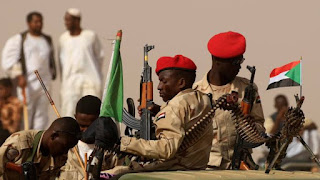Note from Sudan Watch Editor: With respect to the following nonsensical quote taken from the below copied article, it seems apparent that Canadian firm Dickens & Madson's lobbyist Mr Ari Ben-Menashe does not really know who he is dealing with, his client Hemeti is the "commander" responsible for unspeakable atrocities and destruction, including the maiming, raping and slaying of a countless number of unarmed civilians in Darfur and elsewhere, affecting the lives of millions of civilians.
"The lobbyist also compared Dagalo to Israeli Prime Minister Benjamin Netanyahu: “In spite of his past — if it’s a morality contest, [Dagalo] would beat Netanyahu hands down. How many people died in the Middle East trying to make quote, unquote ‘Israel safe’? Sorry, but I have to make this comment.”
Article from Middle East Monitor
Dated 23 July 2019 at 1:46 pm
Ex-Israel spy admits lobbying US on behalf of Sudan military council
A former Israeli spy has admitted to signing a multi-million-dollar contract with Sudan’s Transitional Military Council to lobby the US to support its rule.
The deal was signed by Ari Ben-Menashe, a 67-year-old Israeli businessman based in Montreal, Canada, who heads the “Dickens & Madson” lobbying firm. Menashe is a former Israeli spy and boasts a long, controversial career which has reportedly seen him lobby for African opposition figures, witness US-Iranian hostage deals and execute arms deals.
Dickens & Madson recently signed a $6 million deal with Sudan’s Transitional Military Council, which has ruled the country since former President Omar Al-Bashir was ousted in April.
The documents – submitted to the US Department of Justice under the Foreign Agents Registration Act – stipulated that Ben-Menashe would lobby “the executive and/or legislative branches of the government of the United States and its agencies to support the Transitional [Military] Council of Sudan’s efforts to establish a democratic government”.
The firm would also work on improving the military council’s media coverage, Haaretz reported yesterday. In a separate deal also disclosed in the documents, Dickens & Madson would work with Venezuelan opposition to replace embattled President Nicolas Maduro and lobby Russia to support his proposed successor, Henri Falcon.
Though the documents were first made public last month, Ben-Menashe confirmed the deals in an interview with the Israeli daily this weekend.
Ben-Menashe discussed his Sudanese client Lieutenant General Mohamed Hamdan Dagalo – often known as Hemeti – who heads the country’s Rapid Support Forces (RSF), a paramilitary unit formed from the remnants of Darfur’s Janjaweed militia. Since 2005, the International Criminal Court (ICC) has been investigating allegations of genocide, war crimes and crimes against humanity against Janjaweed leaders for their actions in Darfur.
Though the official documents show that Dickens & Madson is also representing Transitional Military Council head Abdel Fattah Al-Burhan, Ben-Menashe said that Dagalo “is the one with true power”.
Ben-Menashe told Haaretz that despite the RSF’s brutal crackdown on pro-democracy protesters last month – which saw as many as 100 demonstrators killed, tents burned and women raped in Sudanese capital Khartoum – Dagalo has “promised him that all he wants is for Sudan to have fair elections”.
“I’m not his fan really,” he said of the military leader, “[but] he’s the only guy that can keep order until this civilian government takes hold. What we’re also banking on is that there’s an army and there’s the Rapid Support Forces: one would put [a] check on the other.”
The lobbyist also compared Dagalo to Israeli Prime Minister Benjamin Netanyahu: “In spite of his past — if it’s a morality contest, [Dagalo] would beat Netanyahu hands down. How many people died in the Middle East trying to make quote, unquote ‘Israel safe’? Sorry, but I have to make this comment.”
Ben-Menashe also touched on Dagalo’s relationships with regional powers, which are known to include Saudi Arabia, the United Arab Emirates (UAE) and Egypt.
Ben-Menashe told Haaretz that the Sudanese leadership is struggling to balance its support of US President Donald Trump’s administration with the president’s “Saudi friends”, who he claims are pressuring Dagalo to continue sending Sudanese troops to Yemen. Ben-Menashe claims that Dagalo “knows the arrangement is not a good thing for Sudan”.
The Transitional Military Council leadership has met with its regional allies on a number of occasions, with council head Al-Burhan in May visiting the Saudi city of Mecca for emergency summits of the Arab League and the Organisation of Islamic Cooperation (OIC) to discuss the “threat” of Iran in the region.
This came just days after Al-Burhan met Abu Dhabi Crown Prince Mohammed Bin Zayed Al-Nahyan, who “stressed the importance of dialogue between the Sudanese people in this sensitive phase”, as well as Egyptian President Abdel Fattah Al-Sisi, who stressed “Egypt’s readiness to fully support the brothers in Sudan”.
Almost immediately after Al-Bashir’s ousting, Sudan and the UAE agreed to send Sudan $3 billion worth of aid in a bid to support the military council. The deal was understood to include $500 million to be deposited in the Sudanese central bank, while the rest would come in the form of food, medicine and petroleum products.


